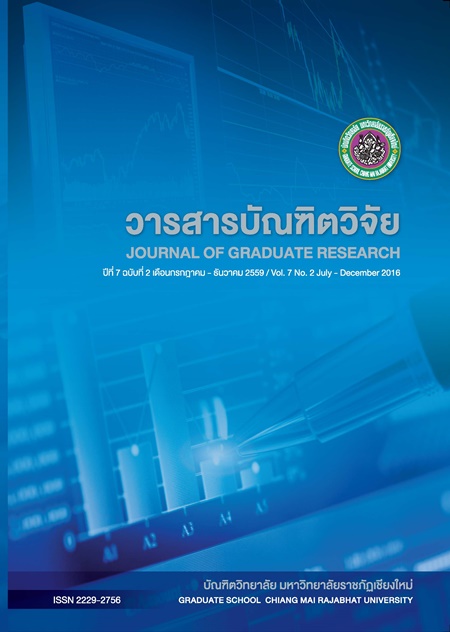การบูรณาการหลักอิทธิบาท 4 กับการเรียนการสอนของศูนย์การศึกษานอกระบบ และการศึกษาตามอัธยาศัย ตำบลหายยา อำเภอเมือง จังหวัดเชียงใหม่
Main Article Content
บทคัดย่อ
การวิจัยนี้มีวัตถุประสงค์ คือ 1) เพื่อศึกษาบริบทการจัดการเรียนการสอนการศึกษานอกระบบและการศึกษาตามอัธยาศัยของศูนย์ตำบลหายยา อำเภอเมือง จังหวัดเชียงใหม่ 2) เพื่อศึกษาแนวคิด หลักคำสอน อิทธิบาท 4 กับการเรียนการสอนการศึกษานอกระบบและการศึกษาตามอัธยาศัย และ 3) เพื่อบูรณาการหลักอิทธิบาท 4 กับการเรียนการสอนของศูนย์การศึกษานอกระบบและการศึกษาตามอัธยาศัย การวิจัยนี้เป็นการวิจัยเชิงคุณภาพ (Qualitative Research) ใช้การสัมภาษณ์เชิงลึก การสังเกตและการเก็บรวบรวมข้อมูลจากเอกสาร (Documentary search) กลุ่มตัวอย่าง จำนวน 30 คน เป็นผู้ให้ข้อมูลหลัก (Key informant) ได้มาด้วยวิธีการเลือกแบบเจาะจง ประกอบด้วย ผู้บริหาร ครูผู้สอนและผู้เรียน เครื่องมือที่ใช้ในการวิจัยประกอบด้วย แบบสัมภาษณ์ แบบสังเกตพฤติกรรมและแบบวิเคราะห์เอกสาร นำข้อมูลที่ได้มาวิเคราะห์เนื้อหา (Content Analysis) และวิเคราะห์แบบอุปนัย (Analytic Induction)
ผลการวิจัยพบว่า 1) บริบทการจัดการเรียนการสอนของศูนย์การศึกษานอกระบบและการศึกษาตามอัธยาศัยตำบลหายยา อำเภอเมือง จังหวัดเชียงใหม่ เป็นการจัดการศึกษาสำหรับผู้ด้อยโอกาส ผู้พลาดโอกาส ผู้พิการ ผู้สูงอายุและประชากรวัยแรงงาน โดยจัดการศึกษาขั้นพื้นฐาน การพัฒนาทักษะชีวิต การพัฒนาทักษะอาชีพ การพัฒนาสังคมและชุมชนที่เน้นผู้เรียนและชุมชนให้มีส่วนร่วม ใช้กระบวนการพัฒนาผู้เรียนให้มีคุณธรรมควบคู่กับการพัฒนาการเรียนรู้ เป็นการสร้างภูมิคุ้มกันให้แก่ผู้เรียน 2) แนวคิดหลักคำสอนอิทธิบาท 4 กับการเรียนการสอน เป็นแนวทางนำไปสู่ความสำเร็จในการเรียนและช่วยให้ผู้เรียนได้เรียนสำเร็จตามความมุ่งหมาย ประกอบด้วย ฉันทะ คือ ความพอใจ มีใจรักในการเรียน วิริยะ คือ ความเพียรพยาม เข้มแข็ง อดทน ไม่ท้อถอยในการเรียน จิตตะ คือ ความตั้งใจ สนใจในการเรียน วิมังสา คือ การไตร่ตรอง ใช้ปัญญาพิจารณาแก้ไขปัญหาในการเรียนอย่างมีเหตุผล 3) การบูรณาการหลักอิทธิบาท 4 กับการเรียนการสอนของศูนย์การศึกษานอกระบบและการศึกษาตามอัธยาศัย โดยนำหลักอิทธิบาท 4 ไปสอดแทรกในแผนการเรียนรู้และเนื้อหาของรายวิชาต่าง ๆ จัดให้มีการเรียนรู้จากการปฏิบัติจริง นอกจากนี้มีการจัดกิจกรรมพัฒนาผู้เรียนในรูปแบบต่าง ๆ เช่น การอบรมจริยธรรมในชั้นเรียน ค่ายคุณธรรม การศึกษาดูงานแหล่งเรียนรู้ทางพระพุทธศาสนา เพื่อมุ่งเน้นให้ผู้เรียนเกิดการเรียนรู้ มีความเข้าใจหลักอิทธิบาท 4 ภายหลังการบูรณาการหลักอิทธิบาท 4 กับการเรียนการสอนของศูนย์การศึกษานอกระบบและการศึกษาตามอัธยาศัยฯ กับผู้เรียนที่มีผลการเรียนต่ำ ขาดเรียนบ่อย ไม่ตั้งใจเรียน ส่งการบ้านช้า พบว่า ผู้เรียนสามารถแก้ไขปัญหาในการเรียน มีความสนใจในการเรียน มีความเพียร ตั้งใจทำกิจกรรมในชั้นเรียนและมีผลการเรียนดีขึ้น
AN INTEGRATION OF THE PRINCIPLE OF FOURFOLD IDDHIPADA WITH THE TEACHING METHODOLOGY IN NON-FORMAL AND INFORMAL EDUCATION OF HAIYA SUB-DISTRICT, MUANG DISTRICT, CHIANG MAI PROVINCE.
The research objectives were 1) to study the context of Instructional Management of the Non - Formal and Informal Education Center located at Haiya Sub-District, Muang District, Chiang MaiProvince,2) tostudytheconceptof theFourfoldIddhipadaPrincipleand Non-Formal andInformalEducationand3) tointegratetheFourfoldIddhipadaPrinciple with Non-Formaland InformalEducation.This research was conductedthroughthequalitativeresearch methodincluded in-depth interview, observation and data collecting. There were 30 samples that consisted of administrators, instructors and students selected by purposive sampling. The Instruments of the research were interview question, observation form and behavior analysis form. The collected data were analyzed by the content analysis and analytic induction.
The results revealed as follows:
Accordingto1) study the context of Non-Formal and Informal Education Center at Haiya Sub-District, Muang District, Chiang Mai Province, it was the place for the people who have got fewer opportunities, missed opportunities to study, the disabled persons, the older persons and most of them were in a workforce age. The center provided the the basically education, the life skill development, the career skills and the social and community development which focused on the students and community participation, and also taught them the morality along with learning. The 2) Fourfold Iddhiada (Paths of Accomplishment; Channda (Aspiration), Viriya (Effort),Citta(Eedication),and Vimamsa(Investigation) wereparticularlyusedintheInstructional Management. These integration could be helped students get success to study and life. And 3) the researcher integrated the Fourfold Iddhipada Principle with Non-Formal and Informal Education by intervened the principle into the field study, the Ethics Training Program, Moral Camp, and the Field Trips at the Buddhist pilgrimage.
After the researcher had integrated the Fourfold Iddhipada Principle with the Instructional Management Non-Formaland Informal Education to resolve the student behaviors, they became the most desirable of school administrators and instructors. This method can be an educational applicationanddevelopment for thepeaceful lifeand work. From former times, theygot thelow school record, frequent absences, studied without intention, sent the homework late, and lazy, etc. Now, they were able to fix their satisfying problems. They had perseverance, willingness to learn and improved academic achievement.


